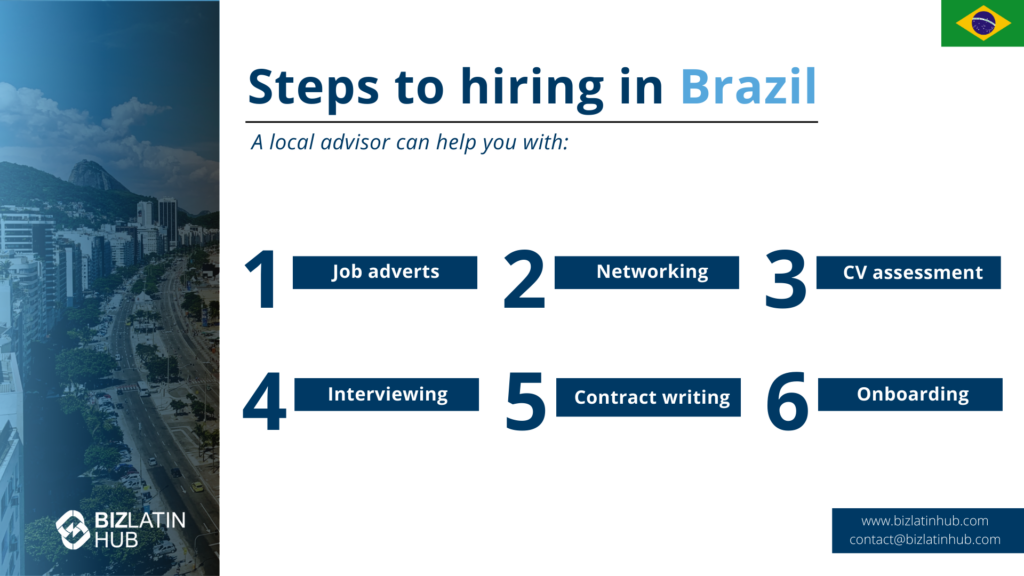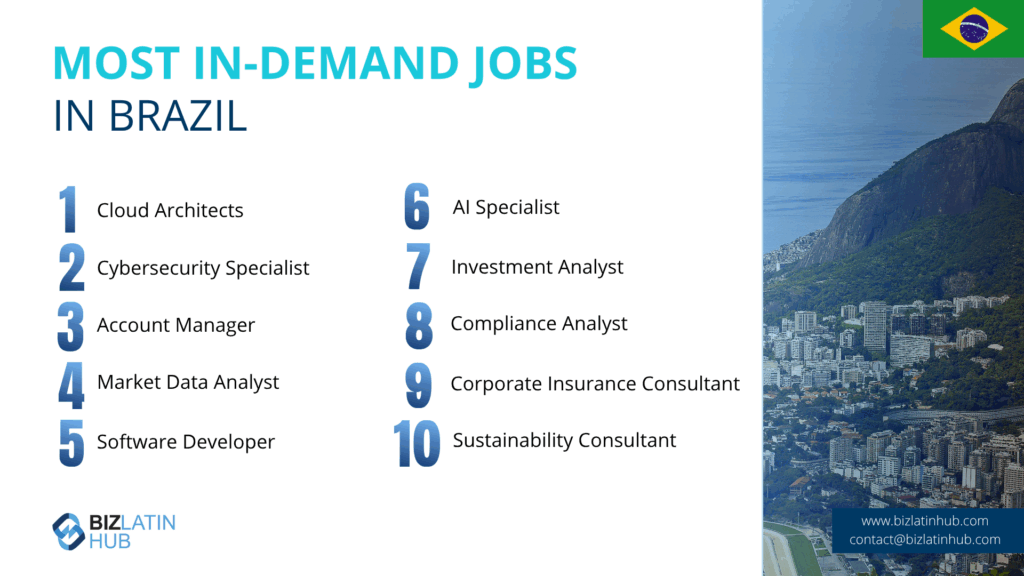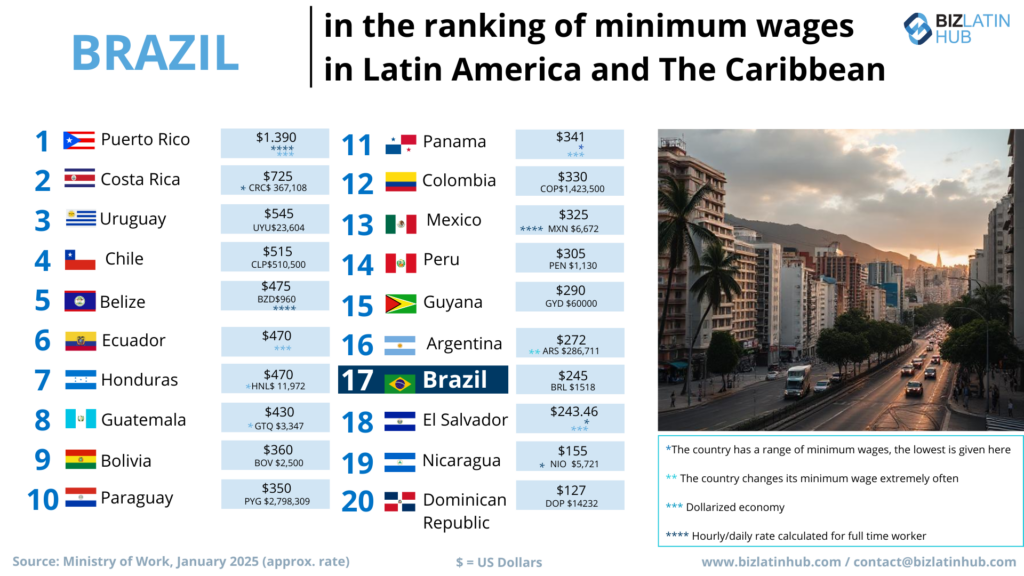A Growing Tech Workforce in Brazil: Opportunities for Hiring, Recruitment & EOR in 2025
When exploring the employment landscape in Brazil, one quickly discovers a burgeoning trend of growth and opportunity, especially in the technology arena.The technology industry is leading the charge, offering an abundance of skilled positions that are shaping the future of the labor market and opening up company formation and incorporation options in Brazil. If hiring in Brazil interests you, the following article offers an overview of the market and advice on the key sectors to investigate. Businesses looking to hire employees in Brazil must consider compliance regulations, recruitment strategies, and local talent availability.
Key takeaways on hiring in Brazil
| What are the key positions for hiring in Brazil? | Key jobs include: Software developers Database administrators Network administrators Information analysts Computer support specialists Employees with miscellaneous computer skills |
| Steps to hiring in Brazil | A local advisor can help you with: Job adverts Networking CV assessment Interviewing Contract writing Onboarding |
| Is PEO legal in Brazil? | Yes, hiring through EOR in Brazil is legal. It ensures compliance with labor laws and simplifies employment without needing a local entity. |
| What is the minimum wage in Brazil? | The current minimum wage as of January 2025 is BRL$1,518 (aprox USD$245). |
| What are the employer contributions in Brazil? | 31.8% of the employee’s salary to the INSS. 8% of the employee’s salary to the government compensation fund (FGTS). |
What sectors are best for hiring in Brazil?
The tech scene leads here, with the country functioning as a regional powerhouse. To meet the country’s expanding tech labor needs, companies are increasingly relying on professional recruitment services Brazil offers. In particular, the following jobs are in hot demand and with a strongly growing supply of skilled workers.
- Software developers
- Database administrators
- Network administrators
- Information analysts
- Computer support specialists
- Employees with miscellaneous computer skills
There is strong demand for all things tech: project engineers, software developers, designers, full-stack developers, database administrators, and data/systems analysts, and technical support roles. So it’s clear that hiring trends in Brazil are leaning heavily toward the technology market.
The most in-demand tech positions in Brazil include Full-Stack Developers, Back-End Developers, and UX/UI Designers, as companies scale digital infrastructure to meet both domestic and international demands.
What are 4 Ways that Brazilian Employers Can Fill the Tech-Talent Void?
Many companies are turning to headhunting services Brazil-based firms offer to identify qualified professionals in executive and technical roles. Roles such as Data Scientists, DevOps Specialists, and Salesforce Developers are increasingly sought after, especially by companies looking to nearshore complex IT functions. Here are the 4 ways that Brazilian employers can fill the tech-talent void:
- Higher salaries.
- Flexible/hybrid work environments.
- Invest in tech-related training.
- Cast a wider net by improving diversity.
Below we explore each of these points in more detail:
- Higher salaries – This one is a no-brainer. It’s a mistake to assume that the lack of tech talent in the Brazilian labor market means that there’s a lack of qualified workers in the country. There are hundreds of thousands of highly skilled tech/IT workers in Brazil, but a large portion of them work for overseas companies. If Brazil-based employers want to attract local tech talent, they need to match or beat the salaries that tech workers are making overseas.
- Flexible/hybrid work environments- Recruiters all over the world are using hybrid/work-from-home environments as an incentive to draw the best tech talent, and employers in Brazil would be wise to do the same. Who wants to battle congested commutes and traffic-jams just to get to an office every day when you can do the same job from the comfort of your own home?
- Invest in tech-related training – One way to fill open positions in your firm is to approach the best people you already employ and offer to pay for them to be trained as software developers, computer engineers, or database administrators, and the like. In many cases, employees already have a solid tech foundation, and training would bring them up to speed (aka up-skilling).
- Cast a wider net by improving diversity – Managers should be looking for more diverse hires, as this promotes innovation and profitability, according to a report conducted by the online employment publication Clinch. Brazil-based employers can open the door to a larger pool of talent by diversifying recruitment strategies, offering equal pay for equal work, sourcing a more diverse range of candidates, and implementing strict anti-harassment/HR policies.
With high inflation, supply chain issues and conflict in eastern Europe, the negative impact of global economic volatility has been felt the world over. Brazil’s economy remains stable, as does its investment climate. Much of the Brazilian business community remains optimistic, with many firms planning to increase investment in technology and training, with an eye on boosting revenue growth.

How much it costs to hire people in Brazil
The cost of hiring in Brazil is less than it would be in richer nations, yet workers are often well qualified and skilled. With significant investment in education over a number of years, the Brazil now has a surfeit of graduates in the labor market that it cannot provide local jobs for. This means that the labor market in Brazil is relatively competitive for an incoming prospective employer.
The minimum wage in Brazil is BRL$1,518 (aprox USD$245). However, this is not necessarily the rate that you should be offering. In top sectors that require qualified and skilled workers, you will need to offer at least market standard rate. A local hiring expert in Brazil will be invaluable in making sure that you are not overpaying or offering unattractive rates that make it hard to recruit quality talent.
Employers in Brazil must make social security contributions equal to around 40% of an employee’s wage. The employer must withhold tax at a rate of 8% of an employee’s remuneration.
Two options for hiring: establish a company or PEO
When entering the market and hiring in Brazil, there are essentially two options available to investors and entrepreneurs. The most common way of doing so is through full company formation to establish a presence in the jurisdiction. However, this may take time and effort, meaning that it is worth considering another option as well, using a Professional Employer Organization (PEO).
PEO: fast and agile
A Professional Employer Organization (PEO), also known as a ‘Registered Employer’ or ‘Employer of Record’, is an organization that provides and supports companies with their human resources functions, from the early stages of recruitment to the payment of taxes and benefits. PEOs undertake the fundamental and time-consuming tasks of human resources teams, allowing companies to focus on the growth and success of their business.
The services of a PEO are particularly useful when businesses seek to hire a local workforce but do not wish to establish a local legal entity. Simply put, a PEO makes it easy to hire staff in Brazil through an outsourced provider. It means you can enter the market and start hiring quickly, without having to commit to full entry until you are sure that it is what you want to do. It is worth noting that regionally there is beginning to be more regulation and PEO in Brazil may not be viable in the future.
The long-term option: direct hiring
This is the gold standard of hiring in Brazil, as it will give you full control over your employees as well as being sure that you will be compliant for the long term. It also gives you a higher status with potential job applicants, who will see you as a more secure long-term employer.
Before you start hiring employees in Brazil, you will first need to get a sense of the legal, financial and cultural lay of the land. Things such as how to sort out the red tape associated with incorporation and how to manage payroll, for example. With a permanent legal presence in Brazil, you will be fully liable for compliance with local law.
A local expert will help when hiring in Brazil, as they will have an extensive network of qualified professionals for top jobs as well as a good idea of the local labor market. They will be able to advise on the best rates to offer and what type of profile you should be targeting. With anti-discrimination legislation important in Brazil, especially for top jobs, they can make sure you are making a fair offer which complies with local law.
After placing adverts and receiving applications, you will want to move towards interviewing potential candidates. This should be done by both a team manager and HR representative at minimum, to make sure that everything is watertight in legal terms. You may want to include other people into the process in order to make a better assessment of the candidate.
It is entirely possible that you may wish to have a second interview, possibly involving other team members as discussed above. It is also common in the region and when hiring in Brazil to provide candidates with an aptitude task to be completed. This usually takes the form of a dummy task that simulates the type of job that will be done in the future and confirm that they possess the skills cited on their CV.
Contracts, too, will be important. A local advisor will be up to speed on what you can and cannot offer. Bear in mind that you will have to follow all the rules established by Brazil. In Brazil, this includes details of termination agreements and in the case of fixed-term or project-based work, the conditions of completion.
Finally, your local advisor will be able to help you with the stages of both the hiring and onboarding process. They will make sure that you comply with standard requirements such as compulsory medical checks and make sure that any probation period is within the boundaries of those established by the labor law in Brazil. This is generally 30 days, though can be extended up to three months.

Labor laws and regulations in Brazil
Before making a move into the jurisdiction, it’s important for companies to understand the labor rights and responsibilities of both employers and employees in Brazil. What follows are a few things that foreign business owners should know about when it comes to the local work culture:
- Work hours – The standard workday in Brazil is eight hours, with the standard workweek up to 44 hours.
- Public holidays – There are 9 nationwide public holidays in Brazil each year, plus state/regional holidays.
- Vacation time – Workers in Brazil are eligible for 30 days of vacation annually. Women are entitled to four months’ maternity leave.
- Contract types – There are essentially two types of main contract in Brazil, indefinite employment and fixed-term employment. However, both temporary and intermittent work is recognized.
FAQs on hiring in Brazil
Based on our extensive experience these are the common questions we receive from clients when looking to hire in Brazil.
1. Why hire talent in Brazil?
Hiring in Brazil offers access to a large talent pool that is located in the same time zone as the North American market, is culturally similar, and is more economical. The combination allows a company to complement an existing North American based team or to establish an independent Nearshoring center within the region.
2. Can I hire top talent in Brazil?
Yes, you can hire top talent in Brazil, often at more competitive prices than in your local market. The country is a regional leader in top tech talent and boasts a thriving and powerful startup ecosystem.
3. What is the level of English for professionals in Brazil?
In key white collar sectors such as tech it is generally solid. University graduates are expected to complete English language proficiency to at least an intermediate level.
4. How many software developers are there in Latin America?
There are around half a million developers alone in the country, with plenty of talent in related fields as well.
5. Can I hire employees in Brazil without incorporating a company?
Yes. Using an Employer of Record in Brazil allows you to legally hire employees without setting up a local entity. This approach ensures compliance and simplifies market entry.
6. What are the downsides of using an EOR in Brazil?
Although EORs are fast and convenient, they tend to be more costly per employee and may be less appealing to senior-level candidates. Prolonged use may also expose your business to permanent establishment risks.
7. When should I set up a company in Brazil instead of using an EOR?
If you’re planning a long-term operation or hiring multiple employees, setting up a company in Brazil is often more cost-effective and better suited to building local operations and culture.

Entity vs. EOR in Brazil: What’s the Right Hiring Strategy for 2025?
Businesses entering the Brazilian market in 2025 have two primary options for hiring: setting up a local legal entity or using an Employer of Record (EOR). While both are valid, setting up a company in Brazil is generally the preferred long-term solution — offering better control, cost efficiency, and talent acquisition opportunities.
Why Setting Up a Company in Brazil Is the Preferred Option
For businesses planning sustained operations or building a local team of any size, establishing a legal entity in Brazil is the most strategic and sustainable approach. It gives you direct control over employment contracts, builds trust with local talent, and strengthens your brand presence in the country.
Advantages of Entity Setup:
- Lower long-term employment costs
- Greater flexibility in hiring and compensation
- Easier to attract and retain top-tier local talent
- Better alignment with your company culture and processes
- Stronger local credibility with clients and partners
This structure is particularly advantageous for hiring technical specialists such as Project Managers, Software Engineers, JAVA Engineers, and Customer Success Managers, where long-term retention and team integration are critical.
Biz Latin Hub provides full support to set up a company in Brazil, including legal entity registration, corporate bank account setup, labor law compliance, and ongoing back-office administration.
When to Consider an Employer of Record (EOR)
An Employer of Record in Brazil is useful for companies that want to hire quickly, test the market, or take on short-term contracts without establishing a local company. Under this model, your employees are officially hired through Biz Latin Hub’s local subsidiary while you retain management control.
Advantages of EOR:
- Fast onboarding – ideal for pilot hires or short-term projects
- No need to incorporate a company
- Simplified legal and compliance management
Disadvantages of EOR:
- More expensive per employee over time
- May be less attractive to senior or strategic hires
- Harder to build long-term company culture
- Extended use can trigger permanent establishment risks
EOR is a tactical option for quick deployment, but if you plan to build a team, expand your footprint, or operate in Brazil beyond the short term, we strongly recommend setting up your own legal entity as the more robust and cost-effective solution.
Biz Latin Hub can help you with hiring in Brazil
At Biz Latin Hub, we offer a comprehensive range of market entry and back-office solutions across Latin America and the Caribbean.
With offices in key cities across the region, along with trusted partners in other markets, our extensive reach makes us well-suited to support cross-border operations and multi-jurisdiction market entries.
As well as knowledge about hiring in Brazil, our portfolio of services includes hiring & PEO accounting & taxation, company formation, bank account opening, and corporate legal services.
Contact us today to find out more about how we can assist you in finding top talent or otherwise doing business in Latin America and the Caribbean.




